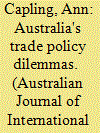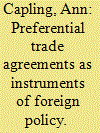|
|
|
Sort Order |
|
|
|
Items / Page
|
|
|
|
|
|
|
| Srl | Item |
| 1 |
ID:
140720


|
|
|
|
|
| Summary/Abstract |
Economists have warned for many years that preferential trade agreements (PTAs) will not necessarily increase economic welfare in Australia given the relatively small size of the economy and the country’s lack of negotiating coin. The Productivity Commission cautioned in its major report on PTAs that there seemed to be a mindset of ‘agreements for agreement’s sake’, in part because of fears of missing out on a bandwagon that has attracted Australia’s major trading partners. Political and security considerations have played an important role in shaping Australia’s approach to PTAs. When politics trumps economics in negotiations of PTAs there is a risk of a rush to premature agreement that produces sub-optimal outcomes, that undermines broader plurilateral and global negotiations, and that introduces new and undesirable distortions in trade and public policies. Various theoretical approaches to trade policymaking provide insights into why Australian governments have been willing to conclude these sub-optimal deals.
|
|
|
|
|
|
|
|
|
|
|
|
|
|
|
|
| 2 |
ID:
082370


|
|
|
|
|
| Publication |
2008.
|
| Summary/Abstract |
In recent years, Australia has had a very active agenda for the negotiation of preferential trade agreements (PTAs) whose net economic benefits remain at best unclear. There has been a strong defensive element to some of this PTA activity but the Howard government also used PTAs to pursue non-economic objectives, such as the promotion of foreign policy and security interests. This article broadly outlines Australia's PTA policy and the problems and dilemmas that it has generated. More importantly, it looks ahead to consider likely scenarios for trade policy under the Rudd Labor government. Each of these scenarios has different implications for policy strategies and outcomes. This article concludes that while there could be significant pay-offs should Labor choose to pursue its traditional preferences for non-discriminatory trade arrangements, the world has changed considerably since the heydays of the multilateral trade system. A commitment to reinvigorating multilateralism will require strong political leadership, imaginative thinking, and creative diplomacy
|
|
|
|
|
|
|
|
|
|
|
|
|
|
|
|
| 3 |
ID:
087936


|
|
|
|
|
| Publication |
2009.
|
| Summary/Abstract |
Students of regionalism almost reflexively include North America in their lists of regions in contemporary global politics. Inevitably students of regionalism point to the integrative agreements between the countries of North America: the two free trade agreements that transformed the continental economy beginning in the late 1980s - the Canada-US Free Trade Agreement that came into force on 1 January 1989, and the North American Free Trade Agreement (NAFTA) between the United States, Mexico, and Canada, that came into force on 1 January 1994 - and the Secutity and Prosperity Partnership of North America (SPP), launched in March 2005. These agreements, it is implied, are just like the integrative agreements that forge the bonds of regionalism elsewhere in the world. We argue that this is a profound misreading, not only of the two free trade agreements of the late 1980s and early 1990s and the SPP mechanism of 2005, but also of the political and economic implications of those agreements. While these integrative agreements have created considerable regionalisation in North America, there has been little of the regionalism evident in other parts of the world. We examine the contradictions of North America integration in order to explain why North Americans have been so open to regionalisation but so resistant to regionalism.
|
|
|
|
|
|
|
|
|
|
|
|
|
|
|
|
| 4 |
ID:
090398


|
|
|
| 5 |
ID:
108706


|
|
|
|
|
| Publication |
2011.
|
| Summary/Abstract |
The Asia-Pacific region is home to a large and rapidly growing number of preferential trade agreements (PTAs). These agreements differ widely in design, scope and purpose. The "noodle bowl" that has resulted runs the risk of distorting investment and trade. Neither global institutions (the WTO) nor regional institutions such as the Asia Pacific Economic Cooperation (APEC) grouping have successfully addressed these issues. Amidst this increasingly messy situation, the proposed Trans-Pacific Partnership (TPP) agreement stands out for a range of important economic and political reasons, not least of which is its potential to take existing PTAs in the Asia-Pacific region in a new direction. The aim of the TPP negotiators is to produce a comprehensive, high quality, multi-party agreement to tame the tangle of PTAs and be a potential stepping stone to achieving the goal of liberalizing regional trade on a non-discriminatory basis. The economic gains from removing border barriers among the countries involved in the initial TPP negotiations are likely to be limited, however, given the small size of many of the economies and the existing PTAs among them. To date, the US has been unwilling to offer a single set of arrangements for all TPP partners, preferring to build on existing bilateral agreements. Pessimism about the immediate results from the TPP should be tempered, however, by considerations of the dynamics that it might set in train; on the other hand, it has the potential to divide the region and exacerbate China's concerns about "containment".
|
|
|
|
|
|
|
|
|
|
|
|
|
|
|
|
| 6 |
ID:
080625


|
|
|
|
|
| Publication |
2008.
|
| Summary/Abstract |
The proliferation of preferential trade agreements (PTAs) in the Asia Pacific region is widely seen as a pragmatic response by governments to the bogging down of the regional and multilateral trade institutions. Analysis of these PTAs has focused primarily on their trade and economic dimensions. There has been less discussion and analysis of the geo-political and strategic dimensions of PTAs in the region. This article explores these issues with reference to the negotiation of a bilateral trade agreement between Australia and Japan. It argues that the drivers for this negotiation are primarily geo-political and strategic rather than economic and commercial, and it explores the potential implications of this. It concludes that the subordination of trade and economic concerns to broader foreign policy objectives in the pursuit of PTAs carries with it considerable risks, not just for Australia and Japan but also for the Asia Pacific region more generally
|
|
|
|
|
|
|
|
|
|
|
|
|
|
|
|
| 7 |
ID:
085537


|
|
|
|
|
| Summary/Abstract |
For the past two decades, 'engagement with Asia' has been a central theme in Australian public policy and public debate about Australia's place in the world. The commitment to Asian engagement has been shared by both sides of federal politics throughout this period; however, when in government the Labor Party (1983-96) and the Coalition (1996-2007) pursued radically different approaches to this common objective. This article contrasts and evaluates the differing approaches adopted by the Labor and Coalition governments, in the context of the domestic and regional debates and controversies that accompanied them. In particular, it seeks to explain why Australia is more engaged with Asia than ever before, in seeming defiance of the widespread criticism of the Coalition government's particular approach to Asian engagement.
|
|
|
|
|
|
|
|
|
|
|
|
|
|
|
|
|
|
|
|
|